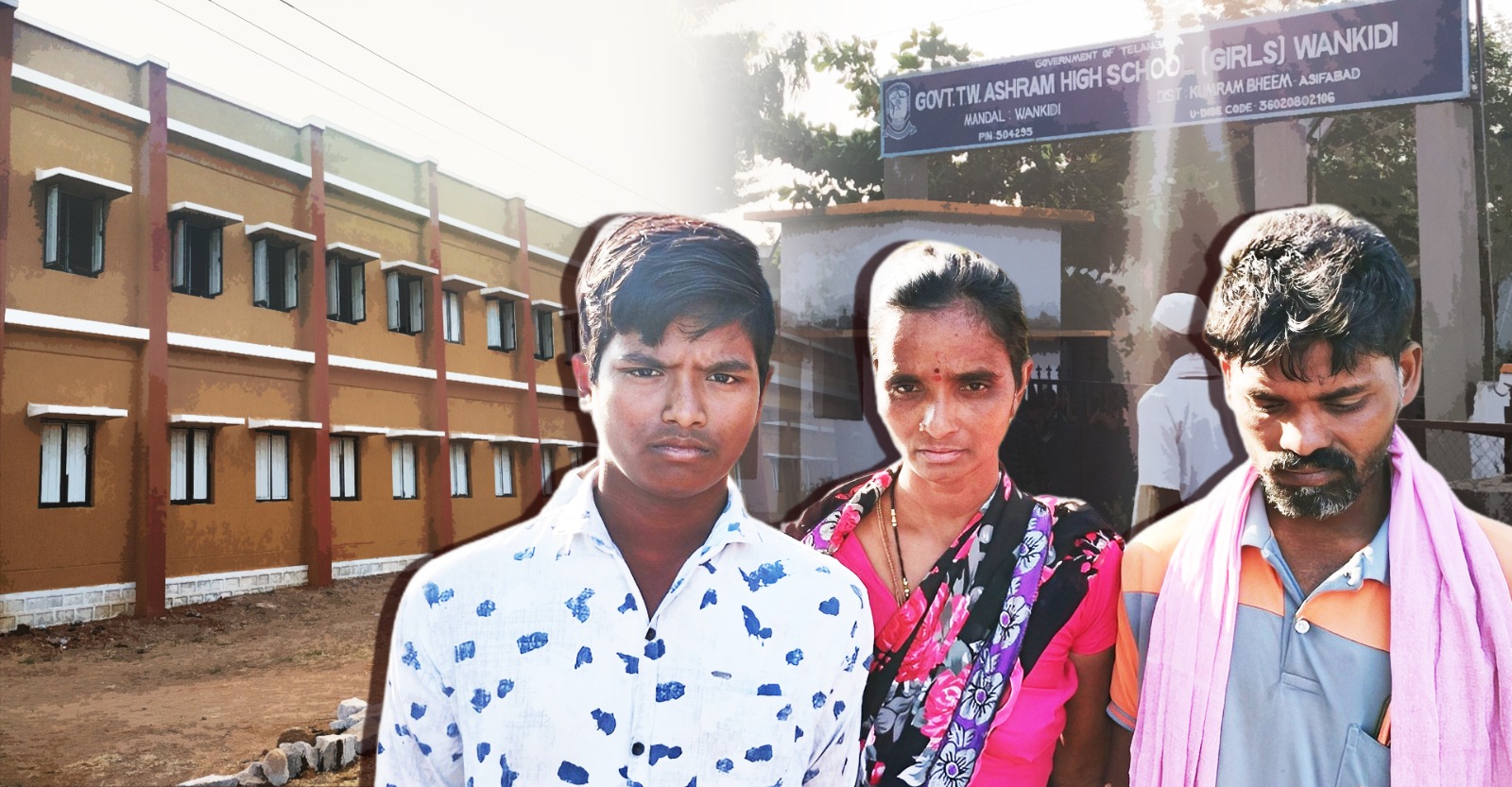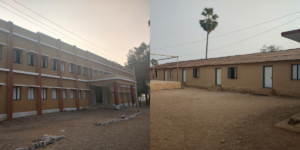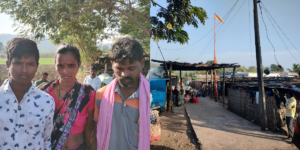Published Nov 28, 2024 | 4:30 PM ⚊ Updated Dec 02, 2024 | 11:00 AM

In Telangana, a string of illness and deaths in government-run schools and hostels are becoming a cause for concern. Illustration: South First.
“She loved studying, she loved it a lot. Even after complaining to us about the food, she chose to stay there,” Geet recounted in a shaky voice while speaking to South First. She is the aunt of 16-year-old Shailaja, who succumbed to food poisoning in a government-run residential school in Telangana.
On 26 November, most of the remote Dhabha village in the Kumaram Bheem Asifabad district gathered to bid farewell to young Shailaja, who passed away after a long battle with food poisoning.
Shailaja had been living at a government-run Gurukul hostel in the Kumaram Bheem Asifabad district in Telangana since her fourth grade and her home, where she stayed till she was in the third grade, became a visiting place during holidays.
Shailaja’s death, unfortunately, is one in a series of instances where students have suffered from food poisoning in Telangana. Shailaja was among the 64 students of a Tribal Welfare Residential School hospitalised for food poisoning in October in Wankidi Mandal of Kumaram Bheem Asifabad district.
In the last couple of months, Telangana has witnessed several such instances of students being hospitalised due to the food they consumed in government-run hostels.
Avanti, a 6th-grade student at the Wankidi Girls Ashram School where Shailaja studied, told South First about the inhumane conditions at the residential school.
“All students are crowded together in small rooms. We sleep on the floors in unclean quarters. On many nights, I can hear and see rats on the floors we sleep on,” she revealed.
She added that bugs were a common sight in the food served at the school hostel and that they were never served enough food for breakfast.
Mirabhai, Shailaja’s mother also revealed that Shailaja had complained about the poor quality of the food. “She told us that things weren’t right, but we thought that was normal for a government-run hostel,” she explained.
“I have no issues with the teachers or the learning. However, even the halls where we eat are very dirty. Things get better temporarily whenever we raise complaints,” Avanti explained.
She was one among the numerous students pulled out of the school following mass food poisoning in October.
Mogula Mahinder, an elder in the village said that many other parents took their wards home fearing for their safety. Following the fiasco on 31 October, the principal was suspended and transferred.
When South First visited government-run residential schools in several districts in Telangana, it became clear that overcrowding is a recurring problem across multiple Gurukuls.
Apart from the Wankidi Gurukul, South First identified at least two other overcrowded residential schools in the Jagityal and Adilabad districts and came across reports of overcrowded hostels in the Nirmal, Karimnagar, and Nalgonda districts.
Meanwhile, the Wankidi Gurukul is witnessing a drop in student count. Reportedly, the school has seen over 100 dropouts owing to the sicknesses in October. The total student count has gone from 570, then, to about 450 on 28 November.
Mahesh is the father of a 6th grader studying in a local residential school in Jagityala’s Peddapur. “The food here is not very good. My son often tells me that he finds wires in the rice and pins in Sambhar,” he said.
“The conditions have improved since the death of those two kids, but there’s a lot left to do,” he continued.
In August, two students of the school died under mysterious circumstances. “On 27 July, three 8th graders became sick. One of them died of seizures on the way to the hospital,” a teacher revealed.

Despite being ready it took 6 years for the new building to be operational in the Peddapur Gurukul (right), old building (left)
“On 3 August, three more students fell sick, we took them to the hospital as soon as they complained of a stomach ache. However, we lost one of them,” she reported.
“In all six cases, the doctors found some poison in their bodies. Yet, there were no sting marks to indicate bites,” she informed.
The incident attracted much public outcry. Deputy Chief Minister Bhatti Vikramarka Mallu also visited the school, eating a meal alongside the students and promising a ₹50 lakh grant to the school.
Madhavi Latha took over as the principal following the suspension and transfer of the earlier principal. “There has been a spike in the number of residential schools spreading the thin resources. While the deputy CM announced the grant, we are yet to receive anything,” she revealed.
“The new building was ready six years ago. Yet, we were forced to stay in the run-down accommodation because of the delayed water and power connections to the new building. After the boys’ death, they finally gave us the connections facilitating our move,” she continued.
The school is surrounded by lush fields on all sides, bound by a low wall. “With the ₹50 lakh, we intended to install a fence to prevent untoward incidents since students try to jump over the current one. The students here are also facing many issues like skin allergies and ringworms. We also wanted to install solar water heaters to tackle this issue,” she added.
“The students in Gurukuls do not come from well-educated or well-off backgrounds. They often hail from tight-knit families in rural areas. For them, the move to a cramped Gurukul where home-like comforts are absent can be very hard. When we fail to address these challenges, it leads to untoward incidents like suicides and accidents,” Madhavi Latha explained.
She said even though the management has the responsibility for the students’ safety it is unrealistic to expect all-day supervision.
The Peddapur Gurukul had about 530 kids before the deaths of the two children, it currently has about 490 as concerned parents made their wards drop out.
Located near the border between Telangana and Maharastra, Dhabha is a village that speaks as much in Marathi as it does in Telugu. Even Mirabhai, Shailaja’s mother, only spoke Marathi.
In a trembling voice, filled with fear and anger, she told South First that the villagers wanted to protest Shailaja’s death.
However, the police arrived in Dhabha and detained eight villagers even before Shailaja’s body arrived from Hyderabad.
“We were helpless, we had to bury her without any protest,” she revealed. Dhabha is a village located about 15 kilometres from Asifabad’s Wankidi.

Shailaja’s family and childhood house
Security personnel surrounded the Government Girls Ashram School in Wankidi, restricting the movement of the press and commuters. On the way to Dhabha, South First spotted at least three buses full of security personnel leaving the village.
The conflict traces back to 29 October when some students of the school fell sick following dinner. They were soon moved to the Wankidi Primary Health Center, before moving to the Asifabad Community Health Center.
Subsequently, Shailaja and three other girls in critical condition were moved to a private hospital in Mancherial, about an hour and a half away from Asifabad.
As Shailaja’s condition worsened, they were moved to the Nizam’s Institute of Medical Sciences on 5 November. She developed kidney and lung complications, necessitating dialysis and ventilator support.
There, she breathed her last on 25 November. Following her post-mortem at Hyderabad’s Gandhi Hospital, her body was transported in an ambulance along with her parents. They arrived in Dhabha at 4 in the morning.
The case of Shailaja in Asifabad and the two deaths in Jagityala are not isolated instances. The BRS, the primary Opposition in Telangana, alleged that at least 42 students lost their lives to food poisoning in government-run schools and hostels.
Siddipet MLA and BRS leader released a list of the 42 deaths on his X handle. The list details 42 instances across the state where students died either due to food poisoning or suicides from 1 January this year.
తెలంగాణ గురుకులాల్లో ఫుడ్ పాయిజన్లు, ఆత్మహత్యలతో మరణ మృదంగం..
గురుకులాల్లో విద్యార్థులు వరుసగా ప్రాణాలు కోల్పోతున్నా, ప్రభుత్వం మొద్దు నిద్ర వీడకపోవడం సిగ్గుచేటు. ఒక్కరు కాదు, ఇద్దరు కాదు, గడిచిన 11 నెలల కాంగ్రెస్ పాలనలో 42 మంది విద్యార్థులు ప్రాణాలు కోల్పోయిన దుస్థితి.… pic.twitter.com/wtUm8bZ69j
— Harish Rao Thanneeru (@BRSHarish) November 17, 2024
When South First tried to verify the claim, it was found that there was a mixed bag of causes for the deaths of the students.
The list of 42 students, last updated on 15 November, includes student deaths due to food poisoning and suicides. The list includes about 17 deaths due to illnesses, 13 suicides due to personal reasons, five suicides due to unknown reasons, and four deaths due to bullying.
Additionally, there were about two accidental deaths and one food-related death.
In one harrowing case, 12-year-old Sai Krishna died because he slipped and fell into a pond in a Karimnagar Gurukul. As there was a shortage of washrooms on the premises, he had to defecate in the open by the pond.
Similarly, in two days, between 8 and 10 August, 12-year-old Nandini from Rangareddy and 16-year-old Pooja from Hanmakonda died of dengue.
In fact, on 26 November, in an ironic series of events, a school reported at least 30 sick students, just six days after it reported about 50 sicknesses on 20 November.
Subsequently, the principal, Mandal and district education officers, and the food contractors were suspended.
Even in Adilabad’s Narsapur, bordering Nirmal district, about 22 students fell sick from food poisoning in April this year. While three cooks were subsequently fired, the outrage regarding the negligence of safety and hygiene standards was still there.
On 31 October, the Department of School Education increased by 40 percent the diet charges for students in residential schools from the existing ₹68.54 crore.
Even when Shailaja was hospitalised in Hyderabad, she was frequently visited by political leaders. State Forest Minister Konda Surekha, and Women and Child Welfare Minister Seethakka visited her assuring support from the government.
Meanwhile, BRS leaders, including MLA Harish Rao and MLC Kavitha visited her to show solidarity and demand justice for the Shailaja and all other victims like her.
Following Shailaja’s death, the family demanded two things from the government, a house and a job. The BRS, however, demanded more.
Speaking to South First, Asifabad MLA Kova Laxmi said they demanded the government pay an ex-gratia of ₹50 lakh to the kin of Shailaja. “They’ve brought in the police here like they are dealing with Naxalites,” she said adding that Shailaja’s parents deserved justice.
Meanwhile, Minister Seethakka promised the family a meeting with Chief Minister Revanth Reddy within a week.
(Edited by Muhammed Fazil.)

